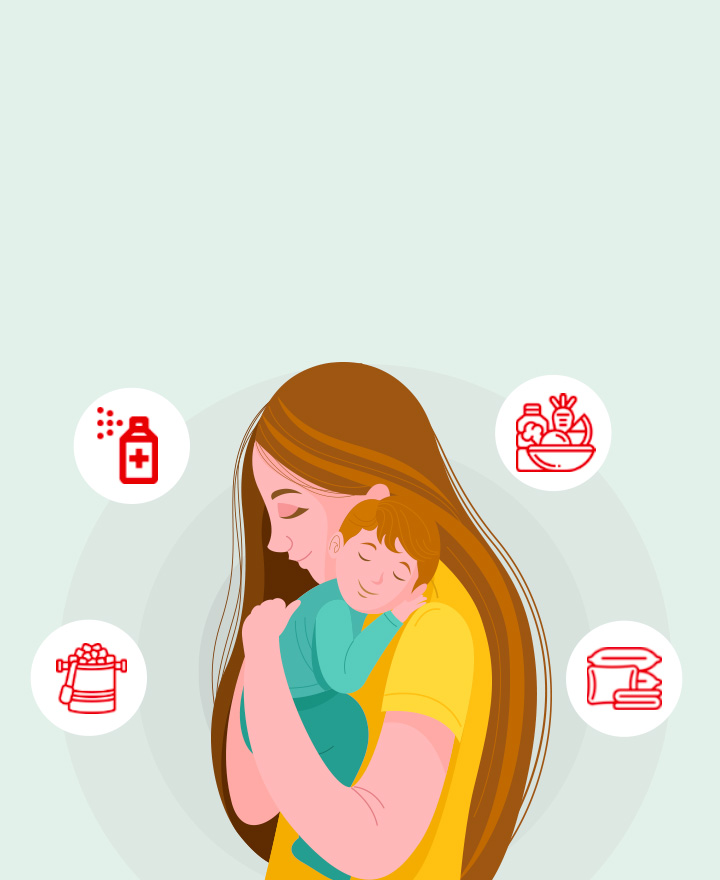

When Can My Baby Start Eating Solid Foods?
Doctors recommend waiting until a baby is about 6 months old before introducing solid meals since this is an important age for additional nourishment such as iron and zinc. For developmental reasons, it is not advised to start before 4 months. Babies benefit from the range of flavors and textures that solid meals provide at six months old. Read on to know more.
What Is The Right Time for Your Baby's First Solid Foods?
Signs indicating when can infants eat solid food are:
• Your baby should be able to sit in a high chair and hold his head steady.
• Watch for cues like watching others eat, reaching for food, and opening his mouth when food approaches.
• They shouldn't push food out of their mouths, a reflex that typically fades between 4-6 months.
• Babies should weigh around double their birth weight, usually about 13 pounds or more.
Consult your doctor to confirm when infants can eat solid food as they can offer personalized advice based on your baby's growth and development. Start with iron-enriched baby cereal and drink water, formula, or breast milk. One meal at a time should be introduced. Begin with diluted food followed by gradually increasing the meal thickness and look out for any allergies. Be mindful of choking risks, honey, unpasteurized items, high-sodium diets, and added sweeteners. Over time, serve a range of food items but remember that it can take several trials before your baby starts to like the new food. So have patience.
How Should You Start Solids?
Use a single-grain, iron-fortified cereal diluted with breast milk, formula, or water as your baby's first solid food. Use a tiny spoon and start with 1 or 2 teaspoons; do not add it to the bottle to avoid gaining too much weight. Gradually, one at a time, add pureed meats, fruits, vegetables, beans, lentils, and yoghurt. Make sure to wait a few days between each new meal.
Foods like peanuts, eggs, and cow's milk might cause allergies in certain people, so be vigilant while consuming them. Steer clear of meals heavy in salt, honey, added sugars, unpasteurized goods, and choking dangers. Give newborns a range of meals from all food groups gradually; it may take a few trials to become used to new tastes.
Conclusion
Introducing babies to eating habits is crucial. Offer diverse, nutritious foods and observe cues for fullness. Avoid overfeeding. Encourage family meals to foster healthy development. These habits set the stage for a lifetime of healthy eating.
One of the important components of our overall wellness is also being financially secured. Healthcare emergencies can happen any time, but a good health insurance policy can protect you from such uncertain situations. To know more about Wellness and other health related tips, visit the wellness corner.
Source: kidshealth.org, healthychildren.org, mayoclinic.org
Disclaimer: This blog provides general information and discussions about health and related subjects. The information and other content provided in this blog, website or in any linked materials are not intended and should not be considered, or used as a substitute for, medical advice, diagnosis or treatment. Kindly contact your Doctor before starting a new medicine or health regime.
Related Articles
10 Best And Worst Foods To Eat Before Bedtime
No Carbs To Skipping Meals - 5 Dieting Myths Which Might Ruin Your Fitness Goals
Benefits Of Eating Curd In Summer: Beat The Heat
Published on May 15, 2024














 Health Insurance
Health Insurance  Travel Insurance
Travel Insurance  Car Insurance
Car Insurance  Cyber Insurance
Cyber Insurance  Critical Illness Insurance
Critical Illness Insurance
 Pet Insurance
Pet Insurance
 Bike/Two Wheeler Insurance
Bike/Two Wheeler Insurance  Home Insurance
Home Insurance  Third Party Vehicle Ins.
Third Party Vehicle Ins.  Tractor Insurance
Tractor Insurance  Goods Carrying Vehicle Ins.
Goods Carrying Vehicle Ins.  Passenger Carrying Vehicle Ins.
Passenger Carrying Vehicle Ins.  Compulsory Personal Accident Insurance
Compulsory Personal Accident Insurance  Travel Insurance
Travel Insurance  Rural
Rural